EU will fine violators of budgetary discipline even on yellow light
Ralitsa Kovacheva, June 9, 2010
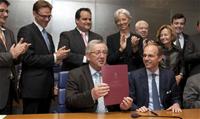 Under pressure of the financial markets and the budgetary problems of some countries in the euro area, the leaders of 16 Euro group countries endorsed and announced the details of the rescue mechanism, agreed on 10 May.
Under pressure of the financial markets and the budgetary problems of some countries in the euro area, the leaders of 16 Euro group countries endorsed and announced the details of the rescue mechanism, agreed on 10 May.
Then it became clear that the complex scheme consists of two components. The first is a fund of 60 billion euros available to the European Commission for emergency needs. The second is the so called Special purpose vehicle (SPV), based on intergovernmental agreements between the eurozone countries. Through the SPV troubled governments may be granted loans up to the total amount of 440 billion euros, guaranteed by the Member States. Until Monday night, however, it was not clear exactly how this mechanism would operate and this is what has created uncertainty on the markets.
According to the decision of the Euro group, the SPV is being materialized in the 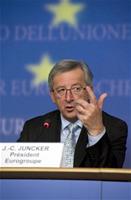 so called European Financial Stability Facility (EFSF), incorporated as a limited liability company under the laws of Luxembourg. The country is also the first shareholder, the chairman of the Eurogroup and Prime Minister of Luxembourg Jean-Claude Juncker announced. The other euro area countries, as well as the volunteers Poland and Sweden, will participate in EFSF proportionally to their share in the paid-up capital of the European Central Bank. For this purpose national procedures have already been launched. The mechanism will be operational when the national procedures in 90 percent of the countries are completed. The purpose of the EFSF is to collect funds which may be granted as loans to distressed members of the euro area of up to 440 billion euros. As previously agreed, the IMF will participate in the mechanism with 50% of the amount allocated by the European Fund to states, which may ask for financial support. All conditions for the granting of loans are the same as those already agreed for the Greek aid, the EU Commissioner for Economic and Monetary Affairs Olli Rehn said.
so called European Financial Stability Facility (EFSF), incorporated as a limited liability company under the laws of Luxembourg. The country is also the first shareholder, the chairman of the Eurogroup and Prime Minister of Luxembourg Jean-Claude Juncker announced. The other euro area countries, as well as the volunteers Poland and Sweden, will participate in EFSF proportionally to their share in the paid-up capital of the European Central Bank. For this purpose national procedures have already been launched. The mechanism will be operational when the national procedures in 90 percent of the countries are completed. The purpose of the EFSF is to collect funds which may be granted as loans to distressed members of the euro area of up to 440 billion euros. As previously agreed, the IMF will participate in the mechanism with 50% of the amount allocated by the European Fund to states, which may ask for financial support. All conditions for the granting of loans are the same as those already agreed for the Greek aid, the EU Commissioner for Economic and Monetary Affairs Olli Rehn said.
The idea is the EFSF to issue a debt of its own, guaranteed by Member States. According to the “European voice”, there was a dispute between Germany and France on this issue. Berlin insisted each country to be liable for an amount no greater than its share of the guarantees. Paris, however, argued that a shared liability was needed to secure the highest possible credit rating for the SPV and thus reduce its borrowing costs. The compromise provides that each Member State will be liable for an amount equivalent to 120% of their guarantees to the fund.
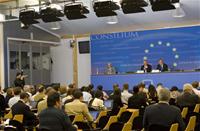 Ministers have also agreed on a number of measures to ensure the best possible credit quality and rating for the debt instruments issued by EFSF. Jean-Claude Juncker and Commissioner Olli Rehn are confident that they will receive the highest AAA rating. A chairman of the board of directors and an exectutive director of the fund will be elected soon, Juncker said.
Ministers have also agreed on a number of measures to ensure the best possible credit quality and rating for the debt instruments issued by EFSF. Jean-Claude Juncker and Commissioner Olli Rehn are confident that they will receive the highest AAA rating. A chairman of the board of directors and an exectutive director of the fund will be elected soon, Juncker said.
The decision on shared liability is likely to accelerate doubts that the facility could be a stepping-stone to a 'eurobond' scheme in which the eurozone is to issue common public debt. The idea is supported by Juncker, and by EU president Herman Van Rompuy, but some Member States like Germany are firmly against it. According to Berlin this would reduce incentives for countries aimed at improving their competitiveness. Voices against this possibility were heard also in the European parliament.
The rescue mechanism, however, is only one side of the coin, Olli Rehn noted. The 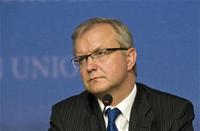 other is fiscal consolidation. In this sense, the taskforce, chaired by the President of the European Council Herman Van Rompoy, has agreed on two key issues: peer review of the Member Sstates' budgets and common surveillance on competitiveness.
other is fiscal consolidation. In this sense, the taskforce, chaired by the President of the European Council Herman Van Rompoy, has agreed on two key issues: peer review of the Member Sstates' budgets and common surveillance on competitiveness.
Member States have agreed on the so-called "European semester". This means national budgetary plans to be presented to the Commission and EU Member States every spring. This concerns only the basic and most general parametres of the budgetary plans and the main aggregates like total revenues, total spending and deficit targets, Van Rompuy explained:.
“Of course, not to be checked in detail or to be decided upon by the European institutions! That is the prerogative of the national parliaments.”
Governments presenting a budgetary plan with a high deficit will have to justify it in front of its peers and also to adjust the plan if recommended. Of course, we need to take into account the specificity of some countries, Van Rompuy said. Asked which countries he meant, the EU president made journalists laugh by saying simply “The United Kingdom”.
Member states also have supported an improvement of the Stability and Growth Pact by creating more sanctions which should be enforced preventively - before the 3% barrier is being violated by a country, president Van Rompuy noted:
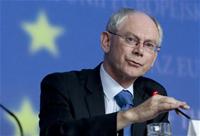 “To use the traffic light image: until now, you only got fined when driving through the red light of the 3 percent; from now on, you could also be in trouble when crossing the orange light. Obviously, the conditions -- under which circumstances orange is an infringement of the rules -- will have to be defined precisely.”
“To use the traffic light image: until now, you only got fined when driving through the red light of the 3 percent; from now on, you could also be in trouble when crossing the orange light. Obviously, the conditions -- under which circumstances orange is an infringement of the rules -- will have to be defined precisely.”
The taskforce had asked the European Commission to come forward with proposals on the new sanctions. Asked if the possibility of imposing non-financial sanctions (such as deprivation of voting rights in the Council of Ministers) was still on the table, Van Rompuy explained that this would mean a change in the EU Treaty. And, as this will take time, the taskforce is now searching for solutions within the existing legislative base.
At the same time, Herman van Rompoy underlined, we are redirecting the focus to the public debts, which were previously entirely in the shadow of budgetary deficits: “We do not propose a special procedure for "excessive debt", but one idea could be to launch the excessive deficit procedure earlier for countries where debt is not reduced quickly enough. This could be one of the triggers for an orange light I just referred to.”
In order to have an objective evaluation, Member States have also supported ensuring the independence of national statistical offices for data provision, free from political influence.
Regarding competitiveness the taskforce had asked the Commission to develop common indicators, which should function as an early warning. In my view, Van Rompuy said, we also need corrective measures for those who do not act in time when warned: “For some economies, membership of the Euro zone acted as a "sleeping pill". We need to avoid a "rude awakening" by the market forces.”
Asked whether the trade surplus of Germany was discussed at the meeting, Van Rompuy answered that immediate priority are the countries with deficits, rather than those with a surplus.
With reagrd to their budgetary policies, the eurozone finance ministers have agreed on an a neutral fiscal stance for 2010 and a clearly restrictive one as from 2011 when the recovery is expected to gain momentum.
A few days ago Germany became the latest country in the euro area, which had 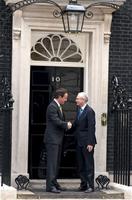 announced spending cuts worth 80 billion euro in four years. The new British Prime Minister David Cameron has also acknowledged that "because the legacy we have been left is so bad, the measures to deal with it will be unavoidably tough". Greece, Portugal, Spain and Italy have launched restrictions too, due to the large budget deficits.
announced spending cuts worth 80 billion euro in four years. The new British Prime Minister David Cameron has also acknowledged that "because the legacy we have been left is so bad, the measures to deal with it will be unavoidably tough". Greece, Portugal, Spain and Italy have launched restrictions too, due to the large budget deficits.
An assessment of the effectiveness of the measures will be made on June 15 under the excessive deficit procedures against 12 countries. Conclusions will be made just before the EU Council on 17 and 18 June, where it is expected difficult but obviously unavoidable decisions to be taken.